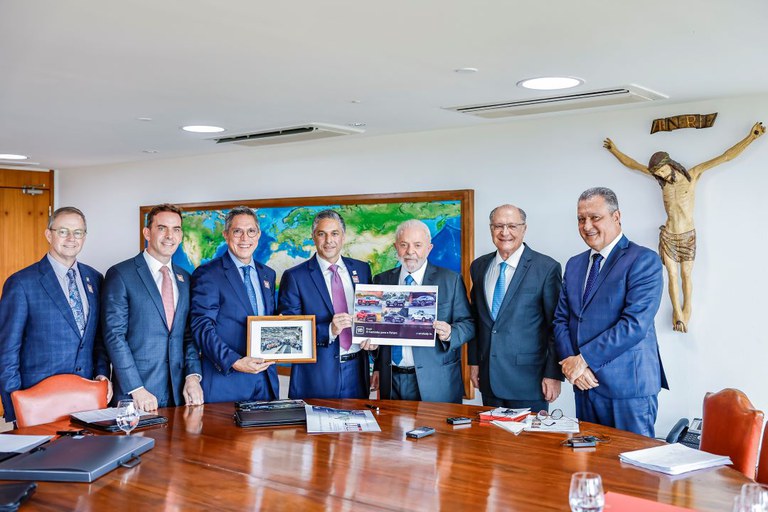Notícias
AUTOMOTIVE INDUSTRY
In meeting with Lula, GM executives announce investment plan in Brazil

President Lula, Vice-president Geraldo Alckmin and the Chief Minister of Brazil’s Civil House, Rui Costa, during a meeting with the president of General Motors International, Shilpan Amin, and the company's President for South America, Santiago Chamorro - Credit: Ricardo Stuckert/PR
This Wednesday (January 24), Brazil’s President Luiz Inácio Lula da Silva received the President of General Motors International, Shilpan Amin, and the company's President for South America, Santiago Chamorro, at the Planalto Palace. The meeting was also attended by Brazil’s Vice-President and Minister of Development, Industry, Commerce and Services, Geraldo Alckmin, and by the Chief Minister of the Civil House, Rui Costa.
President Lula was informed about the current state of the company’s production, investments, and social responsibility policies in Brazil. Next Friday is the 99th anniversary of GM’s presence in Brazil, where it has been operating since 1925.
During the meeting, GM executives announced the first phase of the company's new investment plan in Brazil, worth BRL 7 billion, between 2024 and 2028. It is expected to be followed by additional investments over the next phases. These sums would be invested in improving production capacity and conditions—as well as in technological development, particularly in the fields of electric vehicles, renewable energy, and pollutant control. The new investment cycle should also mean an increase in the company’s capacity to supply to the global market from Brazil.
President Lula welcomed the announcement of the company's new investments, and noted that they are in line with the reindustrialization efforts that have guided his government—such as the Nova Indústria Brasil and Novo PAC programs. Lula also stated that Brazil is the best-placed country to lead the energy transition at a global level, and highlighted that investments in production and technology have a significant impact on development and social inclusion. The President mentioned the resilience of Brazilian democracy as an element of stability as well.
Next, Vice-President Alckmin highlighted the improvement of Brazil's economy during this first year of Lula’s new government—and the recent approval of the country’s tax reform, which makes the country more attractive to investors. Alckmin also mentioned existing policies that improve industry competitiveness, and programs such as Mover, which favors sustainability and decarbonization of the transport sector.
Minister Rui Costa also highlighted the growing priority given to innovation and productivity within the scope of Brazil’s revived industrial policy, and mentioned the federal government’s special interest in the electric vehicle sector.

